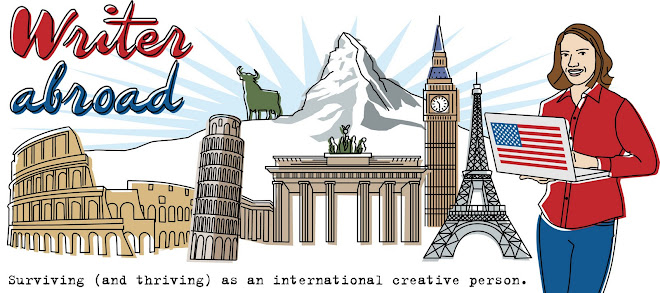Guest
post by Véronique Martin-Place
Véronique Martin-Place is a writer who
specializes in expatriation. She is the author of Finding Your Feet In Chicago – The essential guide for expat families, published
by Summertime Publishing (2012). It is available in Paperback and Kindle
Edition on Amazon. Her website is Writer Forever. She
is also on Twitter (writer_forever) and Facebook.
In this guest post, she explains what the
writing process was like for her first book and how she collaborated with her
publisher.
Finding the idea
 |
| An expat guide to Chicago |
One year after settling in Chicago I was
hired as a ghostwriter to write a guide about Chicago for expats. The guidelines
were extremely specific and they didn’t allow much space for creativity. At the
same time, I was experiencing culture shock—and I was not the only one. Several
families had moved abroad at the same time as we had and we were all searching
for information and advice. Simultaneously, I had also started my own blog,
Expat Forever, where I shared my experiences about expat life as a mom and active
spouse. I received a lot of questions from future expat parents about Chicago, where
to settle, which school to choose, culture shock, among other things. I knew
that the guide I was writing as a ghostwriter didn’t answer these very specific
questions either. I searched for a local guidebook for expat families and I
found out there was none. So I decided to fill this gap by writing Finding Your Feet In Chicago – The essential guide for expat families.
Approaching my publisher
Summertime Publishing was the first
publisher I contacted. I knew that this publisher specialized in “books by and
for people who live or have lived overseas”.
Moreover I had ‘met’ Jo Parfitt, the founder of this publishing company,
through her online course Definite
Articles. I had also read several of her books, including A Career in Your Suitcase. So in
December 2010, I sent her a book proposal. Jo answered me in a timely manner.
We then exchanged a lot of e-mails. Jo’s main question was: is there a market
for your book? I did my homework and she was convinced by my answers. I
received a publishing contract in April 2011.
Writing and editing the book
After agreeing on a detailed table of
contents, I started to write the book. It took me longer than expected but she
was rather flexible on the deadline. Writing in English was a challenge for me,
since this is not my mother tongue. So I hired a professional proofreader and
editor to check my work. One year after signing my contract, I sent my first
draft to Jo. And then the process of editing the whole book again and again began.
At the same time, I worked on the book cover with a designer recommended by my
publisher. It took four additional months to finally hold the book in my hands.
Would I do it again?
I think so and for
two main reasons:
-
Jo Parfitt is a well-known expat writer and now
publisher. She is well connected to a large expat network. So as one of her
authors, you benefit from her database of contacts (fellow authors, print and
web magazines) and the Expatbookshop website. It is very helpful when the time
comes to promote your book, even if this remains the author’s job. And believe
me, promoting a book is more difficult and demanding than writing it. You benefit from professional editors and
designers she has been working with for a long time. So you don’t waste time
looking for the right person to work with on specific issues such as editing,
book cover, and internal book design.
Despite my rewarding experience with
Summertime Publishing, next time I might give self-publishing a shot.
Especially since a new writing and publishing adventure is in the works.
